2025.07.16
Latest articles
2025.07.16
2018.03.16 Updated
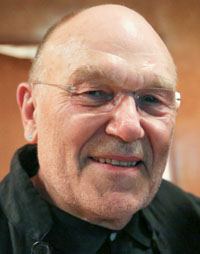
Each year, as Chair of the Awards Selection Committee, I am impressed and encouraged by the ingenuity, concern and attention to detail shown by the entries, and the annual progress they represent towards our goal of creating a universally accessible and enjoyable 'society for all'.
Through the Major Awards - at Grand, Gold and Silver level - the judges are seeking to promote and commend high-quality examples of Universal Design practice, methodology and delivery, and of company-wide commitment to Universal Design as a driver for continuous improvement in product and service delivery. IAUD Awards are given to all entries that meet or genuinely strive to deliver Universal Design solutions demonstrating the key UD qualities of: user-friendliness, social and environmental sustainability, inclusion, and knowledge transfer. Above all the Selection Committee is looking for clear evidence of user-engagement and dialogue in the design process - a fundamental requirement of Universal Design - and in the few cases where such evidence is lacking no award is given.
Last year I and my fellow jurors saw an emphasis on continuous improvement through UD, whereby products and services evolve to meet the needs and aspirations of people in general as well as those with special needs in a truly inclusive way. With attention to personal preferences and lifestyle - the soft side of user-friendliness - Universal Design is increasingly recognized as a strategy for design excellence, pointing the way to a considerate 'society for all' as the norm, rather than an aspiration.
This year, the two Grand Awards, and several other entries have successfully pushed the boundaries of Universal Design in the direction of delivering genuinely life-changing benefits, engaging people in the process and raising the profile of Universal Design and the social and personal benefits it can deliver.
When IAUD was first founded in November 2003, it was the intention of the late Prince Tomohito that over time we would see a major transition in Japan and beyond towards a universally accessible and considerate 'society for all'. And in 2020, when Japan will host the Olympic and Paralympic Games, people from around the world will have an opportunity to discover just how far Japan has come in that direction. It has been my privilege to observe and participate in this evolving process since its very beginnings and the progress made is aptly demonstrated by the Major Award-winning entries from this competition. But I believe there is a much bigger story to be told about the success of UD in Japan as a driving force for social transformation, and how it is changing users lives for the better.
At the level of individual buildings, products and services, Universal Design can only ever be an aspiration, as no single product or service can meet the needs of the whole population. But at the level of environments and systems, where many building, products, services, information and human interactions come together, the goal of a fully inclusive, universal, design for all society, can start to become a reality. In my opinion, Japan is now further down this road than any other country. The 2020 Olympics and Paralympics offer the opportunity to tell that story on the world stage, and this is an opportunity that must not be missed as the Japanese example is truly inspiring.
Announcement of IAUD Awards 2017 Winners
The main selection criteria are "whether the principles of universal design (UD) have been espoused and whether superior activities to achieve them have been proposed or carried out." Judging is based on both the advocacy of the principles and the activities and actions that result from it. Both are comprehensively evaluated as a whole. The judging perspective mentioned in the application requirements is also given importance in the evaluation process.
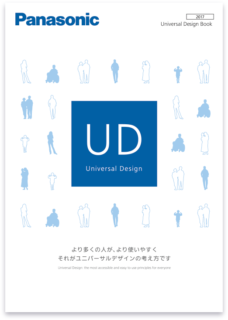
Yet another step forward in Panasonic's long-standing commitment to Universal Design, in the form of a coherent and highly accessible communications platform. An integrated combination of website(s) booklets and associated materials, collectively describe and demonstrate Panasonic's national and international leadership role in developing and promoting UD.
The jury highly commended this entry both as an outstanding example of Universal Design in a communications platform, and for its positive and educational message. A key feature of all the communication elements is their inherent accessibility, implemented in Japanese and English, along with Braille and tactile QR codes linked to website material with voice guidance.
https://www.panasonic.com/global/corporate/technology-design/ud
LIXIL Corporation receives a Grand Award for:
Toilets for All Project
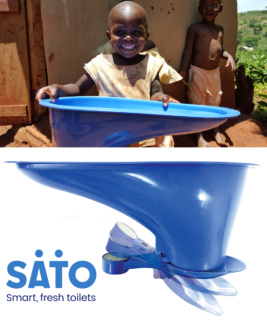
LIXIL Corporation has developed an innovative low-cost toilet solution for developing countries, combined with a sponsorship programme which has resulted in the donation of over 500,000 units for installation in homes and schools in Bangladesh, and the sale of a further 530,000 units world-wide at a price of below $2 each. Variants have been developed to fit the constraints of sub-Saharan Africa, and by working with local partners, manufacturing, distribution, sales and repairs are decentralised and local employment created.
The jury was deeply impressed with the scope, scale and ambition of this project and the exemplary way in which it has been delivered. The result is nothing less than a potentially life-changing and life-saving innovation serving the most needy communities in developing nations and bringing a new dimension to Universal Design.
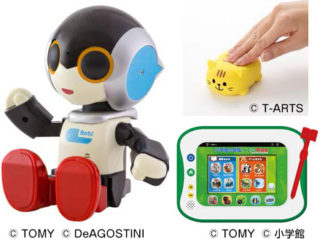
An impressive, 30-year focus on developing and promoting "accessibly designed toys" - mass-market toys with additional features that make them suitable and accessible for children with visual or hearing disabilities. Over that time TAKARATOMY GROUP has played a leadership role within the Japanese toy industry, and also established its own in-house quality standards for accessible toy design. The company continues to play an active role in promoting and campaigning for accessible toys and appropriate industry-wide design standards.
The jury commended TAKARATOMY GROUP for its long-standing track record commitment and achievement in promoting accessible toy design, and building brand value centered on Universal Design principles and practice.
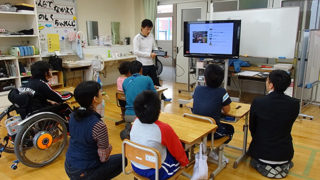
A useful and important collaborative research and development programme aimed at better integrating disabled and able-bodied schoolchildren in the classroom and enabling them to learn together. The programme was established in response to the need urgent for inclusive educational systems and equipment identified by the Japanese Government, and focused on the development of appropriate ICT models and software / hardware solutions.
The jury applauded this very promising public-private collaborative program aimed at breaking down barriers between special needs and elementary schools. By demonstrating potential solutions and methodologies the Tomoni-Manabu projects points the way to a more inclusive future in education and confirms once again that co-learning is key to design for diversity.
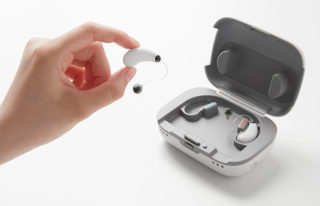
In response to user feedback Panasonic has developed this discrete and carefully designed hearing aid solution consisting of a sealed, behind-the-ear unit containing microphones, processor and rechargeable battery, an overnight charging case, an intuitive and easy-to-use controller, coupled with Bluetooth connectivity and a Smartphone application. The combination of a rechargeable battery with remote control, smart-phone app and automatic Bluetooth pairing make it highly user-friendly. Sealed construction and induction charging, combined with its-in-canal earphone minimise maintenance and increase robustness.
The jury described this entry as 'a pinpoint solution' successfully addressing the conflicting benefits and disbenefits inherent in miniaturization, which is key to good hearing aid design.
The jury welcomed it as an innovative addition to Panasonic's range of hearing aids enabling it to compete with the best available brands world-wide.
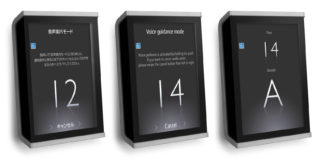
A serious attempt to design a UD lift control panel based on user research with key groups - visually impaired, paraplegics, and wheelchair users. The system is based on a touch-screen operating hall panel which, coupled with call registration, can increase system efficiency by up to 15%. Touch-screen interfaces support multiple input methods but present problems for visually impaired people, which this design addresses through dedicated modes of operation for specific user groups.
The jury saw this as a very promising, practical solution delivering innovative accessibility based on prototype evaluation and iterative development with a range of disabled user-groups. Although the design requires solid verification of in-service performance it is an important step forward that Mitsubishi is committed to pursue through continued research.
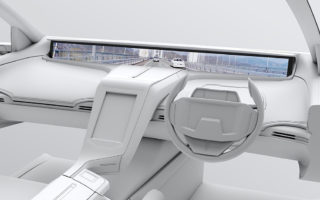
A prototype, all-round-vision system designed to replace conventional driving mirrors with easy-to-view camera images. Based on a dashboard-mounted display panel, the system combines rear and side images and places them directly in front of the driver, significantly reducing head and eye movement and ensuring an increased all-round awareness of position and surroundings. Eye tracking is used to highlight appropriate information, minimising distraction from the road ahead while delivering improved visibility.
The jury commended this all-round vision system as an advanced, and experimental, but valuable near-future enhancement to all-round driver awareness. Although possibly challenging in its organisation of spatial elements the system has real potential to reduce accidents by delivering greater confidence and control, especially to older drivers.
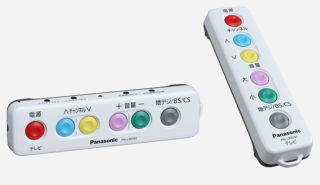
An easy-to-use TV remote designed to better accommodate the needs of older and disabled people. Considerable attention has been paid to a range of features to ensure ease of use for people with disabilities and age-related impairments ranging from moderate to severe, within a clean, functional and simple format. The design was verified through user-testing and effectively extends Panasonic's range of user-friendly remotes, whilst maintaining cross-brand compatibility.
The jury commended 'Let's Remo-con' as a very clear solution addressing the needs of an important and growing sector of the population that relies heavily on the TV for information and entertainment. An excellent example of combining aspects of 'user-friendly' and 'special-needs' design to deliver a UD solution in the classic mode.
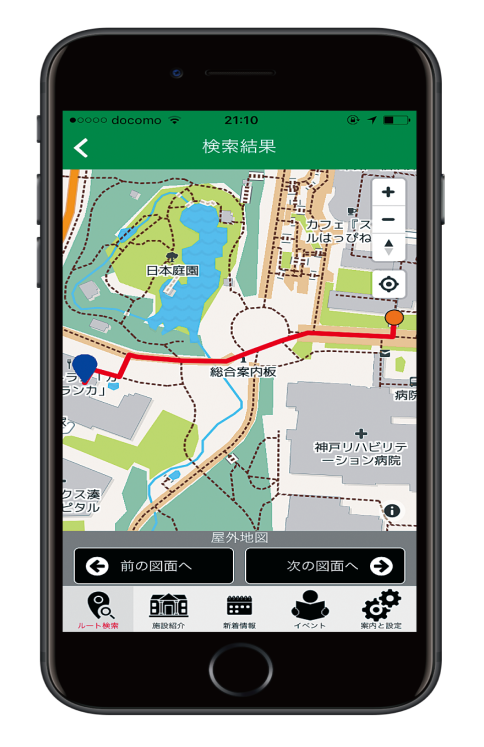
Delivering local guidance information to user-groups with differing needs and capabilities is an important and under-appreciated aspect of accessibility. This Smartphone navigation app provides tailored guidance to everyone, including wheelchair and vision-impaired users, by offering the shortest available appropriate route avoiding those obstacles that pose specific problems for different users.
The jury welcomed this entry as experimental and highly inclusive project offering improved access to and enjoyment of the city environment. While at present it remains a Kobe-specific app, it has great potential for development into a universal accessibility tool.
The jury also expressed a caution, that in developing the app as a more general solution it care should be taken to avoid it becoming associated with segregated access routes for disabled users.
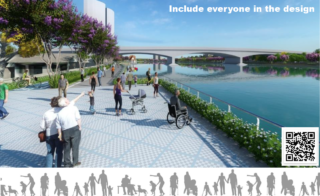
An exemplary, user-centric design development study seeking to create a public, accessible and inclusive waterside amenity along both sides of a 7km stretch of the Chao Phraya the major river in Thailand. Very large numbers of stakeholders, and in particular older, disabled and low-income end-users were consulted, including residents of 35 communities, 14 state agencies and private organisations. The outcome was six UD development plans covering 14kms of riverside, offering high levels of access to the river frontage for wheelchair-users, cyclists and pedestrians, improved flood protection, accessible river linkages and historic views of the city.
The jury was impressed with the ambition of the project, the coherence of the planning process and the exemplary level of user-involvement and consultation. In particular it praised the emphasis on preserving and respecting the diversity and uniqueness of local and regional human environments, which reflect the diversity of human population and cultures.
https://www.youtube.com/watch?v=P3tE3CjWGAQ
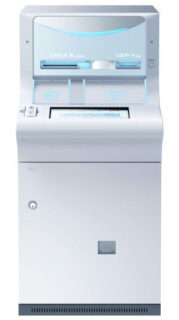
Over the past 18 years (1999-2017) Fujitsu has applied Universal Design thinking to the iterative development of its FACT-V ATM terminals. Over that time consideration has been given to ease of access and use, and considerable research and development has gone into better understanding user needs, in particular those of older and disabled people. The most recent iterations include an audio guidance system and user-friendly screen design, combined within an easy-access structure especially suited to wheelchair users, and complemented with carefully designed lighting to ensure visibility and highlight key features.
The jury applauded this outstanding exemplar of long-term commitment to Universal Design thinking and practice, resulting in a clear expression of the principles and intention driving continuous design improvement through UD...
With an emphasis on safety, security and peace of mind for parents, this design delivers a carefully considered child-friendly portable phone. Rugged construction to withstand usage over a 6+-year period combined with a simple and intuitive user interface offer children an introduction to IT devices and modern communications in a product that successfully bridges the needs of both parents and children.
The jury praised this entry as a classic example of good design for children through careful consideration of the needs and concerns of parents, it pushes boundaries beyond its target user group to become a genuinely family-centric design.
Based on the results of collaborative research with Keio University, Morisawa Inc. has developed 'Biz UD' as a standard font for document creation', which it offers free of charge in three basic types that are Microsoft Office compatible. These are available along with a collection of font templates for first-time users, allowing a wide range of people to work with and create documents of outstanding readability and visibility. Alongside the free version Morisawa offers an advanced, subscription-based version, which includes multiple font types for more demanding users.
The jury congratulated Morisawa for delivering a fundamental solution to a highly significant communication problem, as few document creators have an in-depth understanding of type legibility.
A headset for the workplace, and in particular to noisy environments, where able-bodied workers are effectively disabled. Designed to integrate with a range of conventional site and workplace safety equipment, the headset is lightweight, waterproof and easy to clean. Importantly, it can be used in conjunction with earplugs and dust masks. Consultation with an industrial and manufacturing companies, in-situ prototypes assessments and iterative testing ensured a design fit for purpose.
The jury commended this entry as a good example of how designs and technologies, such as predictive texting, created initially to meet the needs of disabled people later find mainstream roles and uptake.
A useful extension to the curriculum for UD studies developed at Hiroshima. Cosmopolitan University and recognised with an IAUD Award in 2014 on the basis of case-study evidence of its effectiveness. This new module focuses on anticipating and reducing the impacts of potential disaster scenarios, in particular with regard to the survival and specific needs of affected people.
The jury emphasized the fact that we have experienced and learned that any natural disaster makes all of us disabled without exception, and welcomed an approach that encouraged students to be proactive and creative in searching for solutions by better understanding the challenges and problems facing people in disaster situations.
The increasing use of personal IT devices in education has revealed functional and practical problems that are impeding their successful integration into the classroom. Through of in-situ observation studies and an assessment of recognised problems with tablet PCs in classroom use, Fujitsu has incorporated a raft of design improvements in this new product. The result is improved durability and functionality combined with a high level of usability and novel features ensuring better integration with the school environment and curriculum.
The jury commended this entry as exemplifying UD for usability, presented in the form of a robust and 'cool' gadget with student appeal.
Problems with conventional 'braille-block' systems, in particular for wheelchair users and older people are well known. Kinjo Rubber's 'soft mat' offers a simple, elegant and easy-to-install solution for internal use that is well adapted to both temporary and permanent installations. A key feature of the design is the dimpled surface which, while offering sufficient guidance to visually impaired users minimises problems for other users.
The jury congratulated Kinjo Rubber for a genuinely inclusive solution to a long-standing problem, itself the result of an earlier but incomplete solution. This will make a big difference.
A highly accessible folding door that is easy to both open and close, and avoids trapping fingers in the central joint. The door dispenses with a threshold to give an essentially barrier-free entry, in particular in tight spaces. Available in two ranges and a variety of styles and colourways, it offers a user-friendly solution for domestic, care home, hospital and business applications.
The jury commended this entry as an excellent example of universal design, but would have welcomed evidence of user-testing as further confirmation.
A good response to user feedback and the realities of an ageing marketplace. While the design solutions are not in themselves original, they combine to deliver an improved product. Lever re-engineering makes small (135ml) cans as easy or easier to open than larger ones, while other modifications improve usability. A reduction in thickness facilitates production cost-savings and delivers a more environment friendly product.
The jury praised this entry for its user- and age-friendly design based on a series of small but effective improvements.
While public concern is rising over excessive packaging and its environmental consequences, markets realities are changing with population ageing. Asahi Breweries has addressed both issues through a thoughtful programme of design evolution responding to negative customer feedback. Design and engineering improvements combine to increase the openability and strength of six-packs while reducing materials and weight. The result is a container package that is both environment and user-friendly.
The jury saw in this a good example of design evolution that will prove influential due to the scale of the market.
Adherence to Panasonic's UD policy has led to this ultra-lightweight and easy-to-use vacuum cleaner. Weight reduction and design improvements deliver an age- and ability-friendly, fully functional vacuum cleaner with commendably low user demand in operation. Considerable and detailed attention has been given to all aspects of design and engineering in this well thought through product evolution.
The jury praised this entry as an example of UD in the field of consistent product improvement and evolution. Its only concern was that applying Panasonic's UD policy might become a substitute for user-consultation, which the jury sees as fundamental to UD.
A sophisticated evolution of the previous Panasonic robotic vacuum cleaner, offering a combination of improved efficiency, feedback and convenience, especially for disabled or time-poor users. User-surveys indicated problems and concerns with specific features of earlier designs regard to cleaning efficiency. These have been thoroughly addressed in this design iteration, in particular by incorporating spatial recognition coupled with AI learning capability.
The jury valued this design evolution for its efficiency combined with ease of use, in particular for disabled and time-poor users.
With user-research at the heart of its Universal Design process, Toshiba conducted an in-depth study to establish user-priorities for basic household cleaning. This research has led to a range of design improvements to facilitate better handling and manoeuvrability. Key features include the cordless design, roll-along dust canister and easy-grip handle, which in combination deliver high levels of usability.
The jury saw this product as an effective demonstration of universal design underpinned by user study.
With this product Shinohara offers an add-on to existing traffic signals to make road crossings safer and easier to use for older and disabled people. Appropriate light and sound signals are transmitted from low level posts at either side of the crossing, providing auxiliary information to people who may have difficulty seeing and hearing signals placed at a higher level. Post-installation feedback indicates a significant reduction in crossing-related accidents.
The jury commended this entry as an important example of universal design for safety. Crossing the road is matter of life and death, even for the fit and healthy. By better understanding the needs of vulnerable groups and individuals, this design has already proved successful in reducing accidents.
A carefully designed sensory garden, particularly suited to an expanding therapeutic programme for the treatment of autism, As a very recently completed project (November 2017) it is too early to properly judge its success, but the quality and consideration at the heart of the design augur well. In particular, very close but holistic attention has been given to the tailoring of this outdoor space as a therapeutic environment, taking it well beyond the more conventional sensory garden.
The jury found this a potentially exciting initiative. As an autism-centred project its inclusivity is understandably limited, but as an innovative initiative in focused therapy it begins to fill an important gap in current provision.